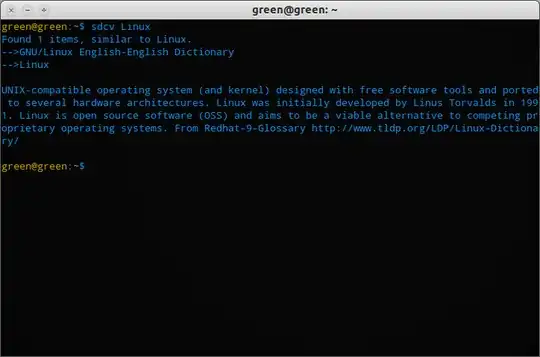Is there any command line offline dictionary? I know that there are some like StarDict and Artha but how about one in the command line?
Also, I tried dict but it is an online dictionary.
Is there any command line offline dictionary? I know that there are some like StarDict and Artha but how about one in the command line?
Also, I tried dict but it is an online dictionary.
sdcv is the console version of Stardict.
1. Install the dictionary
Run the following command in the terminal:
sudo apt-get install sdcv
2. Download dictionary files
Download the dictionary files according to your requirements from the following sources.
3. Install downloaded dictionaries
Make the directory where sdcv looks for the dictionary:
sudo mkdir -p /usr/share/stardict/dic/
The next command depends on whether the downloaded file is a .gz file or a .bz2 file.
If it is a .bz2 file:
sudo tar -xvjf downloaded.tar.bz2 -C /usr/share/stardict/dic
If it is a .gz file:
sudo tar -xvzf downlaoded.tar.gz -C /usr/share/stardict/dic
4. Done!
To search for a word use:
sdcv word

dictd installationThe dict command can easily be used with offline dictionaries. It suffices to install the dictd daemon with its dependencies alongside a local, offline dictionary.
This turns out to be a much easier procedure than installing sdcv as suggested elsewhere on this page.
Below is shown how to install dictd along with the dict-gcide comprehensive English dictionary. There are many more dictionairies available from the standard repositories.
$ sudo apt-get install dict dictd dict-gcide
$ dict word
3 definitions found
From The Collaborative International Dictionary of English v.0.48 [gcide]:
Word \Word\, n. [AS. word; akin to OFries. & OS. word, D. woord,
G. wort, Icel. or[eth], Sw. & Dan. ord, Goth. wa['u]rd,
OPruss. wirds, Lith. vardas a name, L. verbum a word; or
perhaps to Gr. "rh`twr an orator. Cf. {Verb}.]
[1913 Webster]
1. The spoken sign of a conception or an idea; an articulate
or vocal sound, or a combination of articulate and vocal
sounds, uttered by the human voice, and by custom
expressing an idea or ideas; a single component part of
human speech or language; a constituent part of a
sentence; a term; a vocable. "A glutton of words." --Piers
Plowman.
[1913 Webster]
You cram these words into mine ears, against
The stomach of my sense. --Shak.
[1913 Webster]
Amongst men who confound their ideas with words,
there must be endless disputes. --Locke.
[1913 Webster]
2. Hence, the written or printed character, or combination of
characters, expressing such a term; as, the words on a
page.
[1913 Webster]
3. pl. Talk; discourse; speech; language.
[1913 Webster]
You probably also have aspell installed, which has the advantage of giving suggestions for misspelled words. You can call aspell directly on your text file with:
aspell check text.txt
or use it on a single word:
echo wrd | aspell -a
If you're just looking to see if a word is spelled correctly or exists, you can use grep to look through the word list files in /usr/share/dict/, which are provided by the appropriate wordlist packages. An example to see if "emu" is a valid word:
grep -i "^emu$" /usr/share/dict/american-english
That doesn't have any definitions, however.
You can use free dictionary with dict command:
sudo apt-get install dictdsudo apt-cache search "dict-freedict"sudo apt-get install dict-freedict-eng-turdict -Ddict "word"dict -d fd-eng-tur "word"How about downloading dictionary text file from the sites for example this link (warning: 4.5 MB), and then finding the text with command like grep "word" dictionary.txt
Or also by using VIM editor to search for the word with its command eg. /Word. And
by pressing n or N for next or previous occurance of the pattern is more fun with finding meaning of the word.
I use the Princeton University WordNet application. I did not want to deal with Tcl/Tk so prepared a make file that allows you to run WN as a command line application. You do have to compile it, but I provide instructions to help somewhat. I personally find it automatic to popup a terminal on my Linux computer and type "wn unknown-word -over" anytime I want the definition for unknown-word. The nice thing about WordNet is that you get synonyms, antonyms and other linguistic nuances if you want it. Here is my github download link:
Dalton Bentley github link for WordNet command version
Incidentally, I edited all of the Princeton linguistic help files into a rational pdf which those interested in the more advanced capabilities will appreciate.